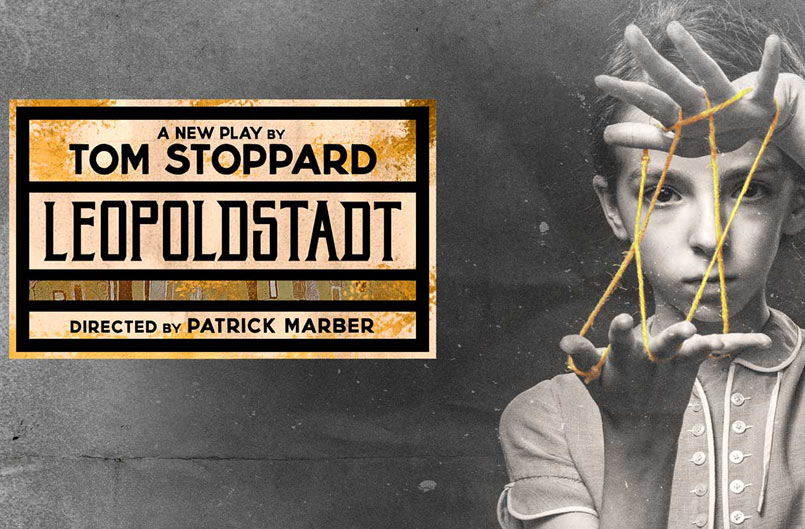
19 Nov TIO NYC: “Leopoldstadt” or Tom Stoppard Gets Religion!
While catching our breath in Brooklyn there was still one more play on deck: Tom Stoppard’s “Leopoldstadt.”
Go here for more on TIO doings in New York.
And scroll down to watch the trailer for the play.

“Leopoldstadt” is playwright Tom Stoppard’s latest work. According to the author, the gestation period was long for an idea that took just about a year to write. The roller-coaster ride of a story spans 50+ years and takes place over two uninterrupted, often heartbreaking hours.
Two hours which were redolent with Stefan Zweig’s memoir,”The World of Yesterday,” a work the esteemed author sent to his publisher in 1942 just before he committed suicide. (As the world turns, we had just read the book.)
“The World of Yesterday” charts the history of Europe from 19th-century splendor, decadence and complacency, through the devastation of WWI, to its coda, the brutality and depravity of the Nazi regime. “The World of Yesterday” is a beautifully penned, heartfelt tribute to an age of humanity and enlightenment that Zweig feared was lost forever. An incomparable record of a lost era that was Austria’s Camelot moment.
“For I have indeed been torn from all my roots, even from the earth that nourished them, more entirely than most in our times,” wrote Zweig. “I was born in 1881 in the great and mighty empire of the Habsburg Monarchy, but you would look for it in vain on the map today; it has vanished without trace. I grew up in Vienna, an international metropolis for two thousand years, and had to steal away from it like a thief in the night before it was demoted to the status of a provincial German town. My literary work, in the language in which I wrote it, has been burnt to ashes in the country where my books made millions of readers their friends. So I belong nowhere now, I am a stranger or at the most a guest everywhere. Even the true home of my heart’s desire, Europe, is lost to me after twice tearing itself suicidally to pieces in fratricidal wars. Against my will, I have witnessed the most terrible defeat of reason and the most savage triumph of brutality in the chronicles of time. Never—and I say so not with pride but with shame — has a generation fallen from such intellectual heights as ours to such moral depths…”
That quote sums up the arc of “Leopoldstadt,” named for Vienna’s historic Jewish district that draws upon Stoppard’s personal history.
Born in Czechoslovakia in 1937 to Jewish parents, Stoppard’s family fled the Nazis, eventually resettling in Britain, a fact of life that saved the decorated writer from the tragic fate of six million European Jews – including many members of his own family – a family he only became fully aware of later in life.
The play opens on an opulent, very crowded Viennese apartment in 1899, where an extended Jewish family is celebrating the holidays.
Hermann is a wealthy factory owner who converted to Catholicism; his brother-in-law Ludwig is a mathematician whose career in academia is dead in the water due to anti-Semitism. The two men debate the extent to which their city and society, once considered the capital of culture and intellectualism (as Zweig describes in his book), has accepted Jews and what lays ahead in the new (read 20th) century.
Subsequent scenes depict the aftermath of World War I, as well as political upheaval and the rise of fascism, culminating in a harrowing moment following the Anschluss (Germany annexing Austria) in 1938, at which time Stoppard’s ancestors are ordered by the Nazis to leave the apartment for a fate unknown.
And too awful to imagine.
In the postwar epilogue, set in 1955, a character, a surrogate for a young Stoppard, meets with two of his cousins. The pair reveals how the family – and with them, the glory that was once Austria – has perished.
We found “Leopoldstadt” with its cast of 38 somewhat difficult to follow. Difficult because it was nearly impossible to tell the players without a scorecard, players old and young, who often spoke in rapid-fire dialog while moving about on the boards.
That said, we applaud the gestalt of the play which, despite the aforementioned quibbles, is a powerful, if devastating work that is beautifully staged under the direction of Patrick Marber. And, under Stoppard’s pen, “Leopoldstadt” is also a meta for this tempestuous period in our country’s history. Once upon a time, it was Austria the Beautiful.
The following is Jesse Green‘s review for The New York Times:
The Viennese Jewish family at the heart of this new Broadway production thinks it is too assimilated to be in danger when the Nazis arrive. They are wrong…


Sorry, the comment form is closed at this time.